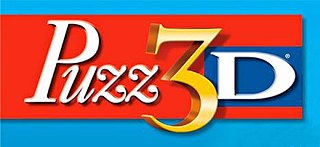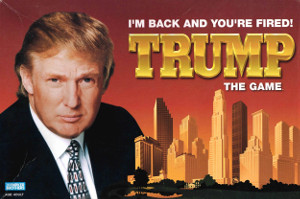Related Research Articles

Monopoly is a multiplayer economics-themed board game. In the game, players roll two dice to move around the game board, buying and trading properties and developing them with houses and hotels. Players collect rent from their opponents and aim to drive them into bankruptcy. Money can also be gained or lost through Chance and Community Chest cards and tax squares. Players receive a salary every time they pass "Go" and can end up in jail, from which they cannot move until they have met one of three conditions. House rules, hundreds of different editions, many spin-offs, and related media exist. Monopoly has become a part of international popular culture, having been licensed locally in more than 103 countries and printed in more than 37 languages. As of 2015, it was estimated that the game had sold 275 million copies worldwide. The original game was based on locations in Atlantic City, New Jersey, United States with the exception of Marven Gardens which is in adjacent Ventnor, NJ.

Cracker Jack is an American brand of snack food that consists of molasses-flavored, caramel-coated popcorn, and peanuts, well known for being packaged with a prize of trivial value inside. The Cracker Jack name and slogan, "The More You Eat The More You Want", were registered in 1896. Food author Andrew F. Smith has called it the first junk food.

The United States Playing Card Company is a large American producer and distributor of playing cards. It was established in 1867 as Russell, Morgan & Co. and founded in Cincinnati, Ohio in its current incarnation in 1885. Its many brands include Bicycle, Bee, Tally-Ho, Champion, Congress, Aviator, Aristocrat, Mohawk, Maverick, KEM, Hoyle and Fournier. It also produces novelty and custom playing cards, and other playing card accessories such as poker chips. For decades the company was based in Norwood, Ohio, but as of 2009, the USPC is currently headquartered in the Cincinnati suburb of Erlanger, Kentucky.

Parker Brothers was an American toy and game manufacturer which in 1991 became a brand of Hasbro. More than 1,800 games were published under the Parker Brothers name since 1883. Among its products were Monopoly, Clue, Sorry!, Risk, Trivial Pursuit, Ouija, Aggravation, Bop It, Scrabble, and Probe. The trade name became defunct with former products being marketed under the "Hasbro Gaming" label with the logo shown on Monopoly games.

Charles Brace Darrow was an American board game designer who is credited as the inventor of the board game Monopoly. Although the original idea for the game came from Lizzie Magie's The Landlord's Game, Darrow has been credited as the creator by Parker Brothers, the game's publisher.

Puzz 3D is the brand name of three-dimensional jigsaw puzzles, manufactured by Hasbro and formerly by Wrebbit, Inc. Unlike traditional puzzles which are composed of series of flat pieces that when put together, create a single unified image, the Puzz 3D series of puzzles are composed on plastic foam, with part of an image graphed on a stiff paper facade glued to the underlying foam piece and cut to match the piece's dimensions. When the pieces are put together, they create a standing structure.
Ralph Anspach was a Danzig-born American economics professor and games creator from San Francisco State University. Anspach was a graduate of the University of Chicago and fought with the Mahal in 1948 in support of the independence of Israel. He is best known for creating the game Anti-Monopoly and the legal battles that followed.

The board game Monopoly has its origin in the early 20th century. The earliest known version, known as The Landlord's Game, was designed by Elizabeth Magie and first patented in 1904, but existed as early as 1902. Magie, a follower of Henry George, originally intended The Landlord's Game to illustrate the economic consequences of Ricardo's Law of economic rent and the Georgist concepts of economic privilege and land value taxation. A series of board games was developed from 1906 through the 1930s that involved the buying and selling of land and the development of that land. By 1933, a board game already existed much like the modern version of Monopoly that has been sold by Parker Brothers and related companies through the rest of the 20th century, and into the 21st. Several people, mostly in the midwestern United States and near the East Coast of the United States, contributed to its design and evolution.
My Monopoly is a service offered to citizens of the United Kingdom by the company Hasbro. The service was designed to allow a user of the My Monopoly website to create a personalized Monopoly game set, which can then be ordered and made for that person. The service was developed by Monitor Media Ltd and introduced in 2002. There were two versions of My Monopoly: the Traditional version; and the Here and Now version, which was introduced in 2005 and discontinued in 2006.

The American rock band Kiss has licensed a large amount of merchandising throughout their career. According to Sandra O'Loughlin in an article for Brandweek magazine, "Kiss has licensed its name to more than 3,000 product categories, from lunch boxes and comic books to credit cards and condoms to become nearly a one-billion-dollar brand."
Task Force Games was a game company started in 1979 by Allen Eldridge and Stephen V. Cole. TFG published many games, most notably including both Star Fleet Battles and the Starfire series of games, which were later novelized by David Weber into such books as In Death Ground, The Shiva Option and Insurrection. Eldridge sold the company to New World Computing in 1988, which became a division of The 3DO Company in 1996 and went out of business in 2003.
TDC Games is a board game and jigsaw puzzle manufacturer formerly located in Itasca, Illinois. The company creates and sells family games, jigsaw puzzles, board games, and adult-oriented games. The company has merged with Wood Expressions of California, www.woodexpressions.com

Funko Inc. is an American company that manufactures licensed and limited pop culture collectibles, best known for its licensed vinyl figurines and bobbleheads. In addition, the company produces licensed plush, action figures, apparel, accessories and games. Founded in 1998 by Mike Becker and Claudia Becker, Funko was originally conceived as a small project to create various low-tech, nostalgia-themed toys. The company's first manufactured bobblehead was of the Big Boy mascot, the well-known restaurant advertising icon.
Formed in 1975, Ral Partha Enterprises, Inc. of Cincinnati, Ohio, United States, is now known as Ral Partha Legacy Ltd. and produces miniature figures in 25 mm, 30 mm, 15 mm, and 54 mm scale. The company's products are made by spin-casting metal alloys which depict soldiers, adventurers and creatures that have been inspired by history and fiction. Their miniatures are sold at gaming conventions, in hobby shops, and by internet and mail order for use in role playing games, wargaming, dioramas, competitive painting, and collecting.

Outset Media Corporation is a Canadian company that develops and distributes family entertainment products, specializing in board games, party games, card games, and jigsaw puzzles. In addition to developing its own games, Outset Media also distributes games and puzzles in Canada for United States-based companies.

Trump: The Game is a board game named after Donald Trump. Milton Bradley Company initially released the game in 1989, but it sold poorly, with only 800,000 copies sold out of an expected two million. Parker Brothers re-released Trump: The Game in 2004 following the success of Trump's reality television series, The Apprentice, from earlier that year. Trump: The Game received poor reviews from critics and the public audience.
The 1976 Big Ten Conference football season was the 81st season of college football played by the member schools of the Big Ten Conference and was a part of the 1976 NCAA Division I football season.

Cat fancy describes the subculture that surrounds cat lovers and their hobbies involving the appreciation, promotion, showing, or breeding of cats. Animal fanciers of cats may refer to themselves as "cat people", "cat fanciers", or "cat lovers". The term "cat culture" has also been used, though is ambiguous.
References
- 1 2 3 4 5 Belz, Kristin (December 27, 2011). "Board Games for the Not Bored". Portland Monthly. SagaCity Media Publication. Retrieved January 11, 2017.
- ↑ Harlow, Doug (November 27, 2016). "Skowhegan gets its own version of classic board game". The Portland Press Herald. MaineToday Media. Morning Sentinel. Retrieved January 12, 2017.
- 1 2 Kentish, Francesca (18 December 2015). "Cat-Opoly is like Monopoly, but better because you buy cats instead of houses". Metro. Associated Newspapers Limited. Retrieved 11 January 2017.
- 1 2 Gilmer, Marcus (April 1, 2009). "Chicago Board Game Gets Makeover". Chicagoist. Chicago Sun-Times. Archived from the original on April 4, 2009. Retrieved January 11, 2017.